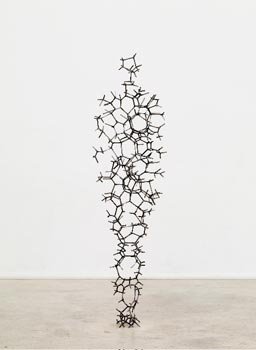Antony Gormley
dal 16/9/2009 al 21/10/2009
Segnalato da
16/9/2009
Antony Gormley
Xavier Hufkens, Bruxelles
Aperture. For this exhibition, the main space in the Hufkens gallery will be filled from floor to ceiling and from wall to wall with a polyhedral space-frame that completely negates the orthogonal geometry of the architecture. The installation becomes, as it were, a framework that surrounds a void: a human-shaped cavern about ten times life size, through which the body of the viewer is invited to wander.

The Scottish scientist Lord Kelvin wondered how space could be most efficiently bounded by an enclosing geometry. He found the answer in the intriguing cellular structure of bubbles and foam. Bubbles form an intriguing geometry with tetrahedral nodes, with elements combining at angles slightly less than one hundred and twenty degrees. During the last three years, Antony Gormley has experimented with the multi-sided forms found in cellular structures. This has resulted in two types of sculpture: solid volumes and open-worked figures. The sculptures transform the area of the body into an open framework of polygonal shapes. According to the artist, a breakthrough was achieved when the polygons were released from a bounding skin.
Aperture represents an essential link in the oeuvre of Antony Gormley. It lends its name to the artist's sixth exhibition at Xavier Hufkens and is the key to the exhibition. Aperture has an extraordinary relationship with its environment because it resembles a hole in space that is filled with the geometrical cellular structure of bubbles. The outer edges of Aperture dramatically grasp the air.
For this exhibition, the main space in the Hufkens gallery will be filled from floor to ceiling and from wall to wall with a polyhedral space-frame that completely negates the orthogonal geometry of the architecture. The installation becomes, as it were, a framework that surrounds a void: a human-shaped cavern about ten times life size, through which the body of the viewer is invited to wander. In addition, the same body-in-rest is repeated in solid, life-size form in the second room of the exhibition. Other works in the exhibition explore the geometry of bubbles in different ways: standing and falling forms in solid volumes and cloud formations.
The work of Antony Gormley examines the body as a place rather than as an object. The exhibition Aperture takes his work to a new level of structural complexity. The body is evoked as an open space of possibility, connected to the earth as well as to space at large. The central installation can be understood as a section of time and space, a spatial constellation holding hundreds of spheres through which the body of the viewer has free passage.
Antony Gormley held his first exhibition at Xavier Hufkens in 1987. Since 1990 he has realized several large sculptural projects around the world such as Critical Mass, Field and Angel of the North. He won the prestigious Turner Prize in 1994. In recent years, he has exhibited, amongst others, at the Hayward Gallery and the British Museum, London, the Humlebaek Museum, Denmark, the Georg-Kolbe Museum, Berlin, the ICA, Singapore and at institutes in Australia and the United States. Closer to us, he will soon realize the monumental work Exposure in Leliestad, the Netherlands.
An exhibition catalogue will be published, including a text by the British physicist and cosmologist Roger Penrose and a text by Maaretta Jaukkuri, Chief Curator at KIASMA Museum of Contemporary Art, Helsinki.
Opening Thursday, 17 September, from 6 to 9 pm in the presence of the artist
Xavier Hufkens
rue Saint-Georges 6-8 - Brussels
Free admission



